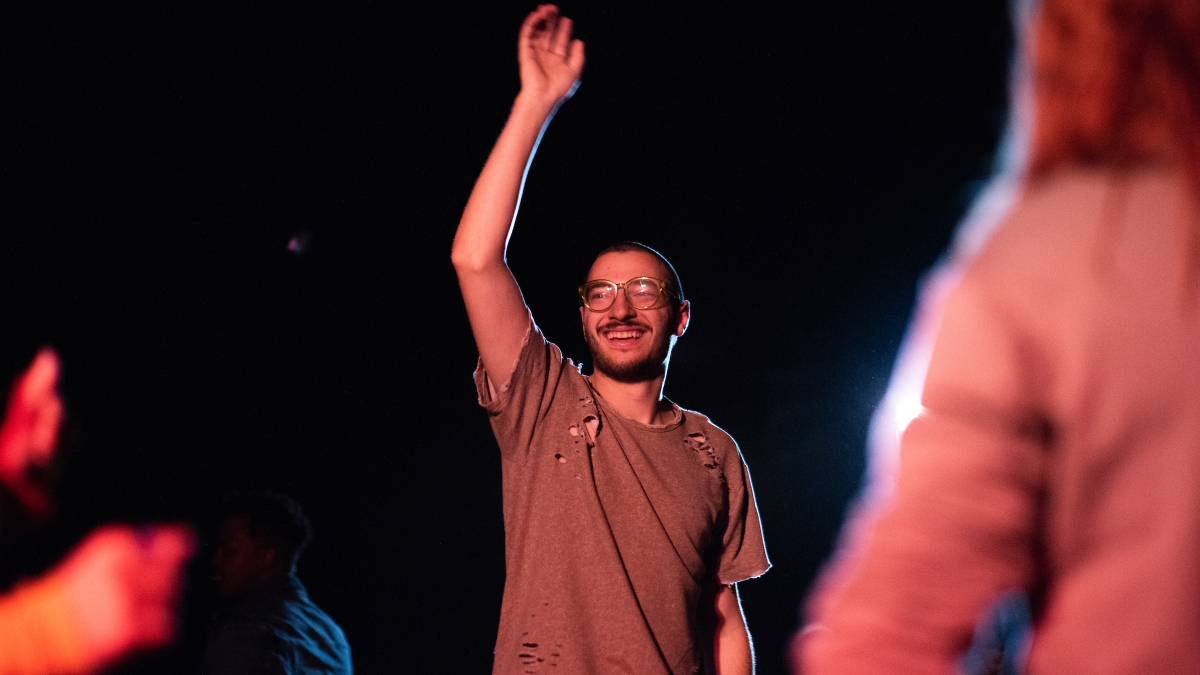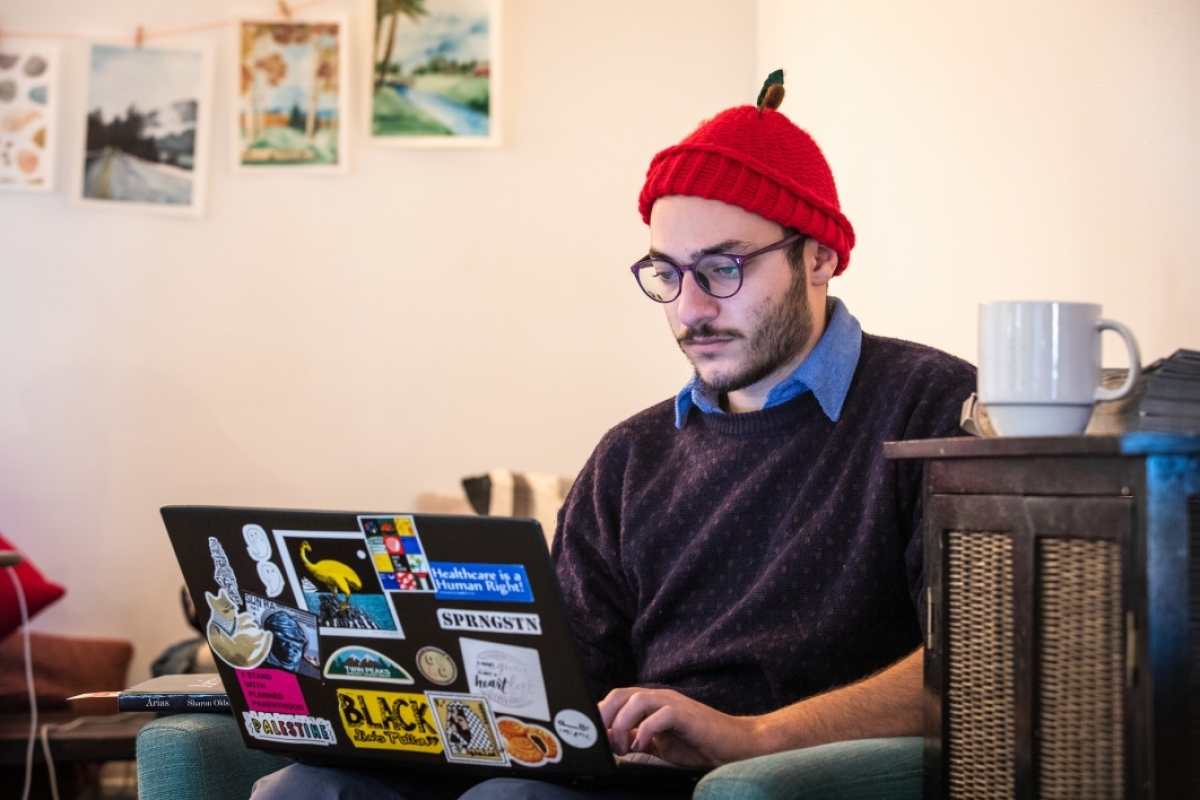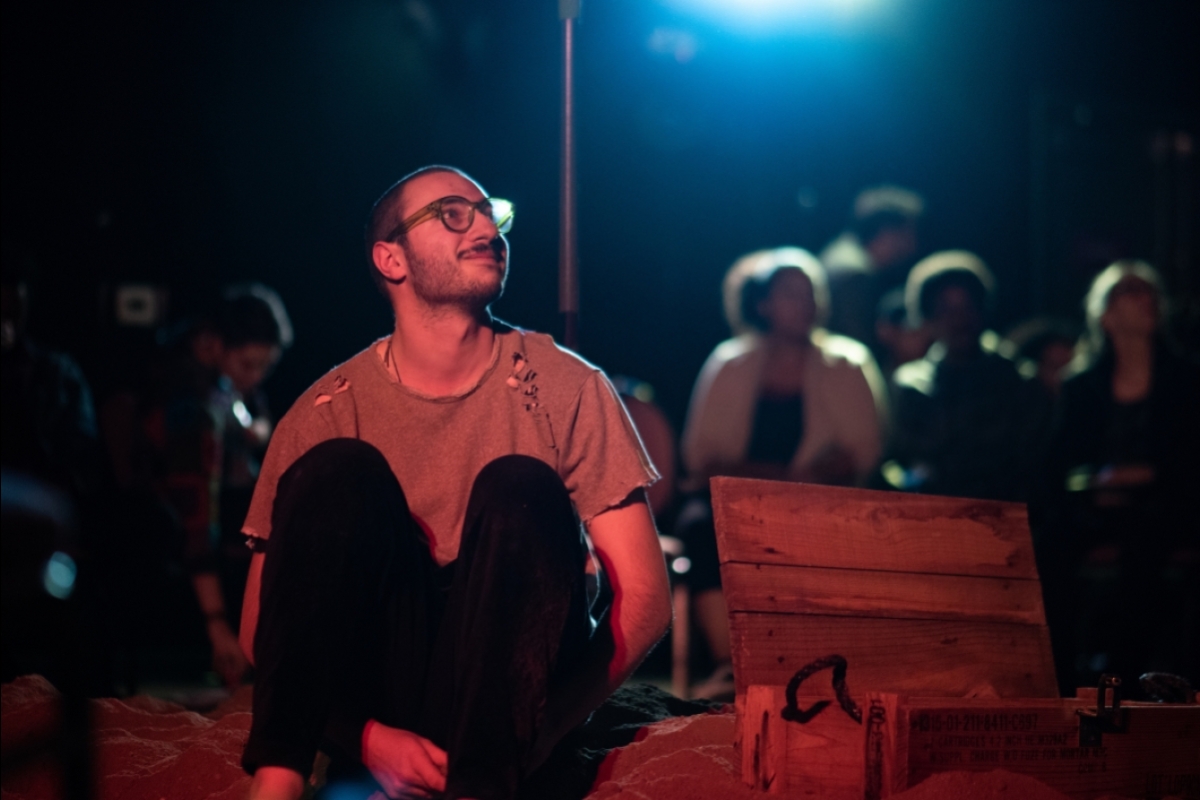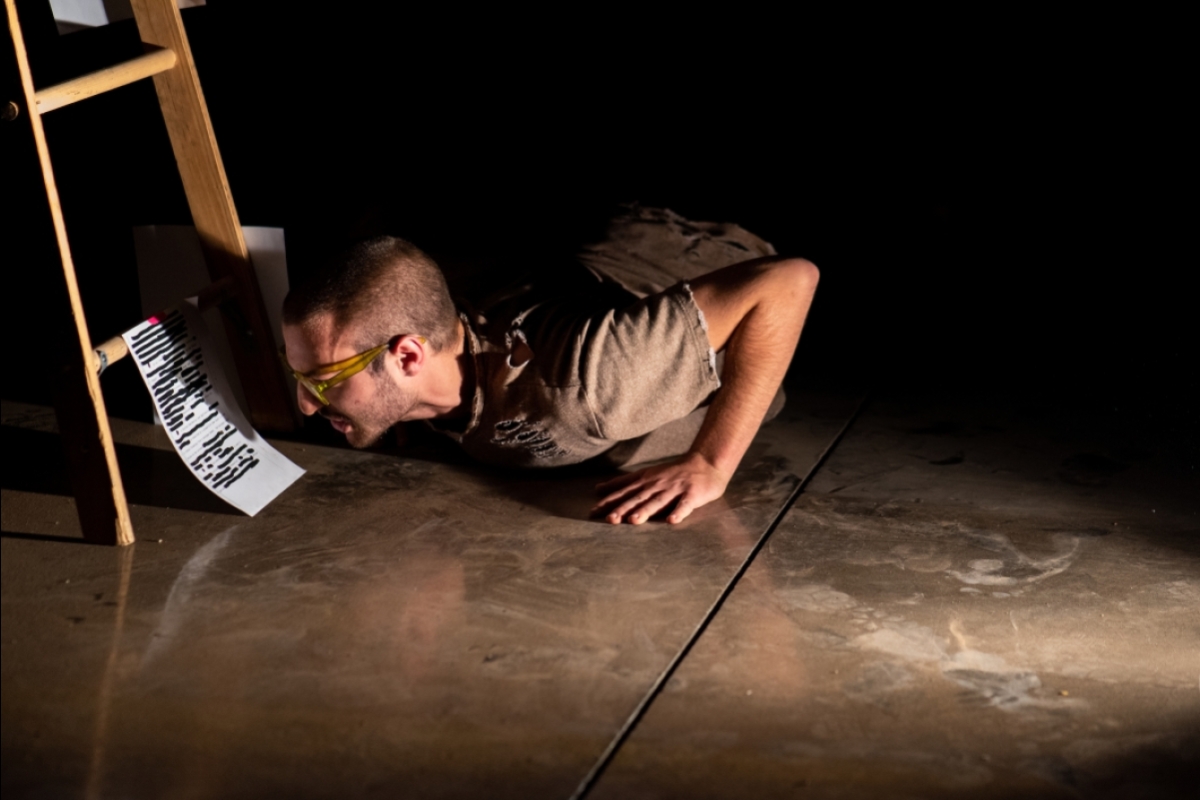Complete black. Then, out of the darkness, from underneath a pile of dirt in the center of the room, emerges Fargo Tbakhi, into the light, for all to see. His clothes are filthy and torn, his face is unshaven and his glasses are askew. And that’s how this Arizona State University theater alumnus and burgeoning performance artist wants us to see him. Because to love him is to love all of him, dirt and all.
But what does it mean to love someone that way, and how do we accomplish that? He’s not sure, and that’s why he’s asking us — the audience at the Dec. 12 Phoenix premiere of his one-person show, “My Father, My Martyr, and Me”; the greater community; the entire world (himself included) — to think about it.
The subtitle of Tbakhi’s show is “Postcolonial Instructions for Loving the Palestinian Body,” a topic that in today’s global climate is innately politically and socially fraught. Indeed, the three characters referred to in the show’s title are Tbakhi himself, his father and the infamous Sirhan Sirhan, known best as the assassin of Sen. Robert F. Kennedy.
In his artist’s statement, Tbakhi explains that he began writing the script for his show in the summer of 2018, “while hundreds of Palestinians, peacefully protesting for their internationally recognized right to return to their ancestral homes, were being murdered by Israel.” In response, his performance is an attempt to give people an opportunity to “understand what it takes to critically, fully, generously love someone like (him).”
Tbakhi was born in California and moved to Phoenix when he was 12. His Palestinian father was largely absent for most of his life, but Tbakhi remembers that when he learned of his heritage from his mother, he was instantly beset by a desire to define its significance.
“Whatever I knew or had heard of Palestinians now applied to my body,” he said. “So over the past many years, I've been trying to understand what that means, and I think it's just a constant question rather than something that I will ever have a definitive answer for.
“Because the answer is like, what does it mean to be an identity of any kind? Those answers have consequences, and they work their way into the way that we treat each other and the way we relate to each other, the way that we legislate each other.”
“My Father, My Martyr, and Me” turned into Tbakhi’s senior-year thesis project. For about nine months, from the fall of 2018 through May 2019, he worked to perfect it under the guidance of his thesis director, Jennifer Linde, principal lecturer at ASU’s Hugh Downs School of Human Communication.
At first, they thought the piece would explore the concept of home, something they’d been considering in one of Linde’s classes, perhaps featuring interviews with Tbakhi’s relatives about their experiences living in Palestine. Then he took a poetry course with ASU Associate Professor of English and MacArthur Fellow Natalie Diaz.
“From there, it went a totally different direction,” Linde said. “He became really invested in incorporating his poetry.”
Tbakhi had only recently begun reading and writing poetry. His class with Diaz impacted him greatly, as did another ASU faculty member, Solmaz Sharif, an Iranian-American poet whose work has focused largely on the language of war. Though he never took a course with her (he laments that he was unable to because she joined ASU the year after he graduated), he had asked for her debut book of poetry, “Look,” for Christmas after initially being captivated by the title poem and promptly devoured the rest of it.
“I was like, ‘Oh, wow, I've never read anything like this,’” he said. “I was obsessed with it.” He even memorized and performed 10 minutes of it for his speech and debate team at ASU.
“She takes the U.S. Department of Defense Dictionary of Military and Associated Terms and repurposes that language into poems and forces context back into it,” Tbakhi said. “It’s like she’s taking language that has become collateral damage, that has been used to sanitize and simplify loss of human lives and human failings, and she’s wrestling power back from the state by doing something with the language that is subversive and destabilizing.”
At the recent launch of ASU’s Center for Imagination in the Borderlands, directed by Diaz, Sharif was one of the featured performers. She read her poem “Drone,” which closes “Look” and includes such lines as, “two generations ago my blood moved through borders according to grazing seasons / then a lifeline of planes / planes fly so close to my head filled with bomblets and disappeared men.”
Both Tbakhi and Sharif will be contributing to the upcoming Desert Nights, Rising Stars Writers Conference, hosted by ASU’s Virginia G. Piper Center for Creative Writing, taking place this Friday and Saturday, Feb. 21-22, on the Tempe campus. Sharif will participate in a panel discussion, “The Political Landscape of Creative Writing,” and will present the workshop “Say it Plain.” Tbakhi will present the workshop “Unarcheology: Anticolonial Queer Aesthetics, Re-Purposing, and Putting Things Back in the Ground.”
“Unarchaeology” is a term Tbakhi uses to describe the act of subverting the traditionally accepted practices of archeology in which notions about groups of people are derived from artifacts whose meanings can be misinterpreted.
“I was just thinking about archeology and the ways that performance and storytelling is a lot like archeology, especially when we're talking about people who are dead,” he said. “And this performance is my way of trying to reckon with, like, what do I do with these 267 names of Palestinians who have been killed this year? How do I just carry it around? And I started to think that my performances — of what at this time was still a thesis project in the works — felt a lot like digging people up and telling their story, which is what archeology is. When we do that, though, there's this delusion of objectivity. There’s a long history of Western people digging up things that they think they understand, which then shape how they treat X group of people. Then I started to think, what can I do that isn't that?”
In high school, Tbakhi was fascinated by the Kennedy family. It’s part of the reason he chose Sirhan Sirhan as one of the characters in his show. If accepting himself meant accepting everything that comes with identifying as Palestinian, he figured, it meant he had to find a way to accept Sirhan Sirhan, who had murdered a man Tbakhi revered. So he started combing through pages of Sirhan Sirhan’s diaries, looking for evidence of some sort of humanity he could relate to. He believes he found it, and in part of his show, he sings aloud some of the entries he thinks display it best.
“It was really compelling,” said Linde, who pored over the diary pages with Tbakhi during his rehearsals. “When he first got all of the diary entries and brought them to rehearsal, it was so emotional because you could see how there were moments of political anger, and then some moments of instability. But as we were reading all of this, this person began to emerge. I knew who he was, but I had never humanized him.”
Tbakhi calls it “rehumanizing,” rather than humanizing.
“I think there are so many people who deserve that level of reevaluation,” he said. “Everyone does. We understand Sirhan Sirhan as someone who was crazy, someone who was violent and someone who murdered a wonderful, very beautiful person. So for me, part of this was going back and finding things that give you pause or make you reevaluate the story. There were a long series of actions and traumas and violences that led to that act. And to focus on just that thing as like this crystallizing moment of a person's existence doesn’t tell the whole story.”
Of course, Tbakhi also had to afford the same level of rehumanizing to his father.
“It's a little difficult in my particular situation because my dad was not a really consistent presence in my life when I was growing up,” he said. “But part of this project is to say, in order to love one of us, you have to love all three of us. And I think that also entails questioning what it means to love someone, and I think it’s complicated and shifting, and it involves forgiveness and holding them accountable. It’s being willing to understand a person in all their fullness and complexity.”
Tbakhi first performed the show in March 2019 at ASU’s Empty Space Theater, a black-box experimental space for which Linde serves as artistic director.
“It was quite an amazing performance,” she said. “I’ve staged a lot of pieces in the Empty Space, and for an undergrad student to reach that level of textual mastery and audience participation ... It was really powerful.”
The whole piece is 90 minutes long, and Tbakhi is moving and reciting his own words — with the exception of the Sirhan Sirhan dairy entries — throughout. It’s a veritable exercise in endurance. And the audience doesn’t get a pass on that: At various points, Tbakhi asks members of the audience to dance with him (at the December premiere, when the vast majority were up out of their seats, gyrating and grooving with one another, he shouted, “Colonize this!”), toss a ball back and forth and finally, to re-bury him in the dirt mound from which he came forth at the onset.
“It’s a big ask of people,” he concedes. “It's not an easy 90 minutes to sit through. But it's something that we have to do together; we are working through it together. It's a dialogue. I might be asking you to catch this ball and throw it back, but the point is I am asking for something and you're allowed to say no. There were people who said no to the dirt and people who said no to dancing. And that's OK. But my point is that this isn't something I can do by myself.”
Tbakhi’s next performance of “My Father, My Martyr, and Me” will take place at the OUTsider festival in Austin, Texas, this week. As someone who identifies as queer, it’s another aspect of himself he believes is important to acknowledge in his work.
“In many ways, Palestinians are already queer in some way,” he said. “They're bodies that are not right. They're understood as improper in some way because they are perceived as moving in the wrong places or in the wrong ways. So it's this narrative that, again, is wrapped up in so many of the things I touch on in the show, which is to say that so many of the ways that we are relating to each other are not love.”
Top photo: As the crowd begins to dance along with him at the Dec. 12 Phoenix premiere of his one-person show, "My Father, My Martyr, and Me," Fargo Tbakhi shouts, "Colonize this!" Photo by Meg Potter/ASU Now
More Arts, humanities and education

2 ASU professors, alumnus named 2025 Guggenheim Fellows
Two Arizona State University professors and a university alumnus have been named 2025 Guggenheim Fellows.Regents Professor Sir Jonathan Bate, English Professor of Practice Larissa Fasthorse and…

No argument: ASU-led project improves high school students' writing skills
Students in the freshman English class at Phoenix Trevor G. Browne High School often pop the question to teacher Rocio Rivas.No, not that one.This one:“How is this going to help me?”When Rivas…

ASU instructor’s debut novel becomes a bestseller on Amazon
Desiree Prieto Groft’s newly released novel "Girl, Unemployed" focuses on women and work — a subject close to Groft’s heart.“I have always been obsessed with women and jobs,” said Groft, a writing…





